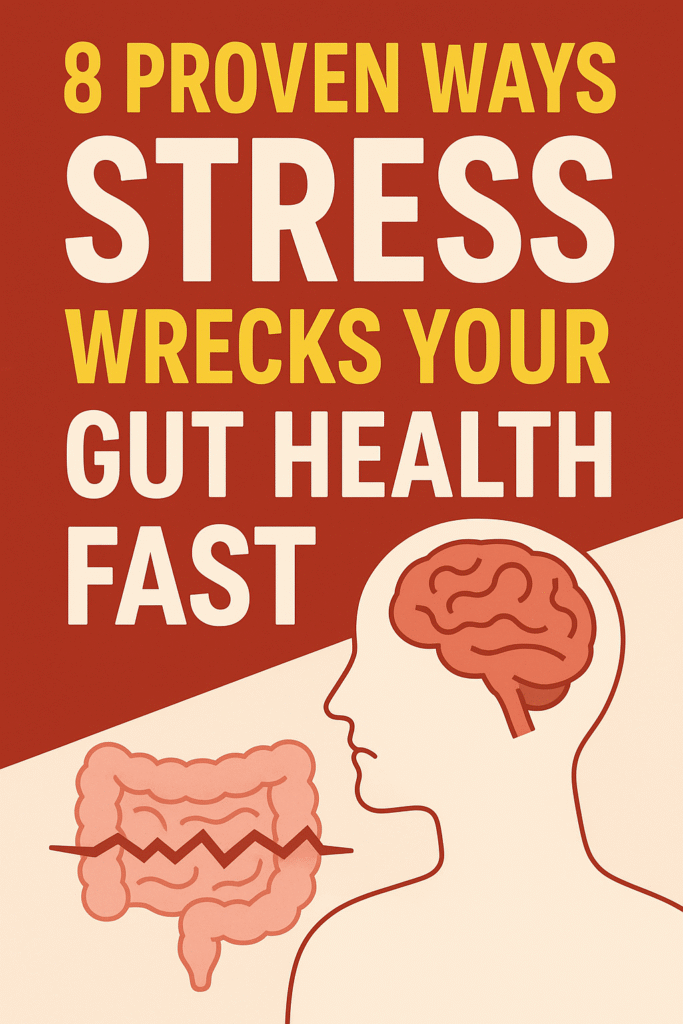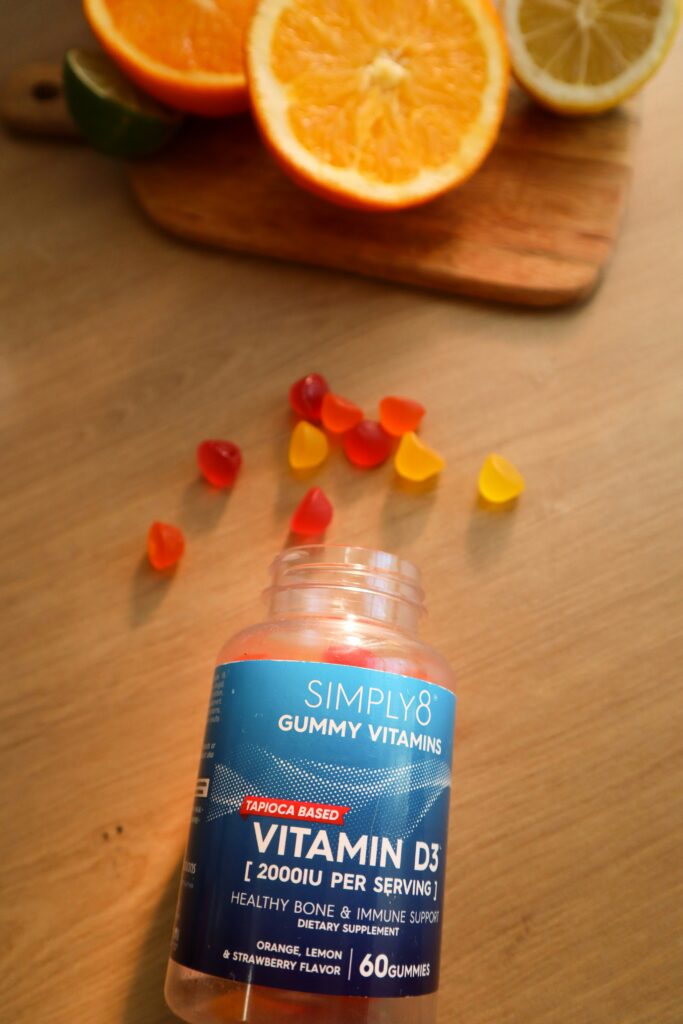
⚠️ Affiliate Disclaimer: This post may contain affiliate links, which means I may earn a small commission — at no extra cost to you — if you make a purchase through one of these links. I only recommend products or services I genuinely trust and believe can provide value. Thank you for supporting My Medical Muse!
8 Proven Ways Stress Wrecks Your Gut Health Fast
Can Stress Affect Gut Permeability? The Science Behind the Gut-Brain Link
Table of Contents:
- What Is Gut Permeability and Why Does It Matter?
- What Is the Gut-Brain Axis?
- How Stress Impacts the Gut: The Science Explained
- Can Stress Cause Leaky Gut Syndrome?
- Signs Your Gut Is Under Stress
- Natural Ways to Reduce Stress and Support Gut Health
- Supplements That May Help Strengthen Gut Barrier Function
- Final Thoughts
What Is Gut Permeability and Why Does It Matter?
Think of your gut lining as a highly selective security system, it’s designed to allow nutrients, vitamins, and water into your bloodstream, while keeping harmful bacteria, toxins, and undigested food particles out. This is called gut permeability.
When your gut lining is healthy, the cells are joined tightly by proteins called tight junctions, but if these junctions become loose or damaged, unwanted substances can “leak” into the bloodstream, a phenomenon often referred to as leaky gut syndrome or increased intestinal permeability.
This can trigger chronic inflammation, immune dysregulation, and symptoms throughout your body from brain fog to bloating to autoimmune flares.
What Is the Gut-Brain Axis?
Your brain and gut are in constant conversation through a complex communication network known as the gut-brain axis. This bidirectional link involves:
The vagus nerve, which sends signals both ways between the brain and the digestive tract.
The enteric nervous system, often called the “second brain,” which governs gut function.
Neurotransmitters, like serotonin and dopamine, produced in the gut.
The microbiome, the trillions of bacteria that influence both gut and mental health. This connection is so strong that what’s happening in your mind can literally change the integrity of your gut and vice versa.
How Stress Impacts the Gut: The Science Explained
When you’re under stress, whether it’s from work, relationships, trauma, or even too much caffeine, your body activates the hypothalamic-pituitary-adrenal (HPA) axis. This leads to the release of stress hormones like cortisol and adrenaline.
These stress responses trigger a cascade of changes in the gut:
Reduced Digestive Function:
Under stress, digestion takes a backseat, blood flow is redirected from the gut to the muscles (fight or flight mode), slowing digestion and reducing enzyme production.
Disrupted Gut Motility:
Stress can cause either sluggish digestion or rapid transit time, leading to constipation or diarrhea.
Altered Gut Microbiome:
Chronic stress reduces microbial diversity and favors the growth of pro-inflammatory bacteria like Clostridium and Escherichia, while beneficial strains like Lactobacillus and Bifidobacterium may decline.
Increased Intestinal Permeability:
Most importantly, stress affects the gut lining. Cortisol and inflammatory cytokines can break down tight junctions, allowing harmful molecules to pass through the gut wall into circulation. This is how stress literally makes your gut more “leaky.”
Can Stress Cause Leaky Gut Syndrome?
Yes, chronic stress is a scientifically recognized contributor to leaky gut. A 2014 study published in Frontiers in Immunology showed that stress weakens intestinal tight junctions, making the gut lining more permeable. Animal studies show that psychological stress increases intestinal permeability via mast cell activation and cytokine release.
A clinical review in Current Neuropharmacology emphasized how stress-related HPA axis activation affects gut barrier integrity, microbiota balance, and inflammatory response. Even short-term stress like exam anxiety or a big presentation has been shown to alter gut permeability temporarily.
Chronic stress, however, causes persistent low-grade inflammation, weakens your gut lining, and can contribute to autoimmune disorders, food sensitivities, and chronic GI issues like IBS.
Signs Your Gut Is Under Stress
Not sure if your gut is reacting to stress? Here are some signs to watch out for:
- Bloating and gas after meals
- Frequent diarrhea or constipation
- Food sensitivities you didn’t have before
- Brain fog or difficulty concentrating
- Unexplained fatigue
- Skin flare-ups (eczema, acne, rashes)
- Joint pain or muscle aches
- Mood changes, especially anxiety, irritability, or sadness.
These symptoms might not only be due to stress but if you’re experiencing multiple at once, it’s a sign that your gut-brain axis could be dysregulated.
Natural Ways to Reduce Stress and Support Gut Health
You can’t always eliminate stress, but you can change how your body responds to it and by managing stress wisely, you’re also healing your gut.
Mind-Body Practices:
- Deep breathing (Box breathing, 4-7-8 method)
- Meditation or prayer
- Yoga or tai chi
- Journaling
These activities activate your parasympathetic nervous system, also known as the “rest-and-digest” mode, which directly calms the gut.
Gentle Movement:
Walking in nature, dancing, or light stretching lowers cortisol levels and supports healthy digestion without stressing your body like intense workouts might.
Sleep Hygiene:
Lack of sleep raises cortisol and impairs gut healing. Aim for 7-9 hours of quality rest. Use blackout curtains, turn off screens, and avoid eating right before bed.
Nourishing Foods:
Fermented foods (kefir, kimchi, yogurt) to support microbiome balance.
- Bone broth for gut lining repair.
- Colorful veggies for antioxidants and polyphenols.
- Omega-3-rich foods (salmon, flaxseeds, walnuts) to reduce inflammation.
- Avoid ultra-processed foods, sugar, alcohol, and caffeine during gut healing.
Set Boundaries & Rest:
Sometimes the best thing for your gut is a firm “no.” Protect your peace. Your gut listens.
Supplements That May Help Strengthen Gut Barrier Function
While food and lifestyle changes are the foundation, supplements can give your gut lining extra support especially when healing from stress-related damage.
Here are science-backed options to consider:
L-Glutamine:
An amino acid that fuels intestinal cells and supports the repair of tight junctions.
Zinc Carnosine:
Helps restore gut barrier integrity and reduce inflammation in the intestinal lining.
Probiotics:
Look for strains like Lactobacillus rhamnosus GG or Saccharomyces boulardii known to support both microbiota and immune function.
Slippery Elm or Marshmallow Root:
These herbs form a soothing, mucilaginous coating over the gut lining like a natural bandage.
Vitamin D:
Supports immune regulation and gut lining health. Many people with gut issues are low in it.
Adaptogens (Ashwagandha, Rhodiola):
Support your stress response and HPA axis regulation, helping break the stress-gut cycle.
Always consult with your healthcare provider before starting a new supplement especially if you’re on medications.
Final Thoughts
Stress isn’t just “in your head” it’s in your gut, too.
Thanks to the gut-brain axis, your mental and digestive health are deeply intertwined. Chronic stress can wear down your gut lining, unbalance your microbiome, and trigger symptoms that ripple throughout your whole body. The good news? You have power, through daily practices like mindfulness, gentle movement, and nourishing foods, you can help your gut heal and restore its barrier strength.
If you’ve been dealing with mystery symptoms that come and go, it’s worth looking not just at what you’re eating but at what’s eating you.
Your gut hears everything your mind says, so treat them both with care.
👩⚕️ Need Personalized Health Advice?
Get expert guidance tailored to your unique health concerns through MuseCare Consult. Our licensed doctors are here to help you understand your symptoms, medications, and lab results—confidentially and affordably.
👉 Book a MuseCare Consult Now

